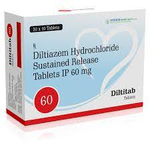dicard
Introduction to Dicard
Dicard is a medication primarily used to manage certain cardiovascular conditions. It is known for its effectiveness in treating hypertension, angina, and certain types of arrhythmias. By helping to relax and widen blood vessels, Dicard ensures better blood flow and reduces the heart's workload. This medication is often prescribed by healthcare professionals to help patients maintain a healthier heart and circulatory system. Dicard is available in various forms, including tablets, capsules, and injections, making it versatile for different patient needs and preferences.
Composition of Dicard
The active ingredient in Dicard is Diltiazem, present in a dosage of 30mg. Diltiazem is a calcium channel blocker that works by inhibiting the influx of calcium ions into cardiac and smooth muscle cells. This action helps in dilating the blood vessels, reducing the heart rate, and lowering blood pressure. By doing so, Diltiazem effectively alleviates the symptoms associated with high blood pressure and angina, providing relief and improving the quality of life for patients.
Uses for Dicard
- Management of hypertension (high blood pressure)
- Treatment of chronic stable angina (chest pain)
- Control of certain types of arrhythmias (irregular heartbeats)
- Prevention of heart attacks in patients with coronary artery disease
Side Effects of Dicard
- Dizziness or lightheadedness
- Flushing or warmth in the face
- Weakness or fatigue
- Swelling in the ankles or feet
- Headache
- Nausea
- Bradycardia (slow heart rate)
Precautions of Dicard
Before taking Dicard, it is important to inform your healthcare provider about any existing medical conditions, especially liver or kidney disease, heart conditions, or if you are pregnant or breastfeeding. Avoid consuming grapefruit or grapefruit juice while on this medication, as it can interfere with the effectiveness of Diltiazem. Patients should also avoid driving or operating heavy machinery until they know how Dicard affects them, as it can cause dizziness. Regular monitoring of blood pressure and heart rate is recommended to ensure the medication is working effectively.
Conclusion
Dicard, with its active ingredient Diltiazem, is a trusted medication for managing cardiovascular conditions such as hypertension and angina. Available in tablets, capsules, and injections, it offers flexibility in administration to suit patient needs. While effective, it is important to use Dicard under medical supervision and adhere to prescribed dosages to minimize potential side effects and achieve optimal results. Always consult with a healthcare professional for personalized advice and guidance when using Dicard.
Similar Medicines
Disclaimer : This information is not a substitute for medical advice. Consult your healthcare provider before making any changes to your treatment . Do not ignore or delay professional medical advice based on anything you have seen or read on Medwiki.
dicard
Prescription Required
Manufacturer :
Intas Pharmaceuticals LtdComposition :
diltiazem











.svg)
